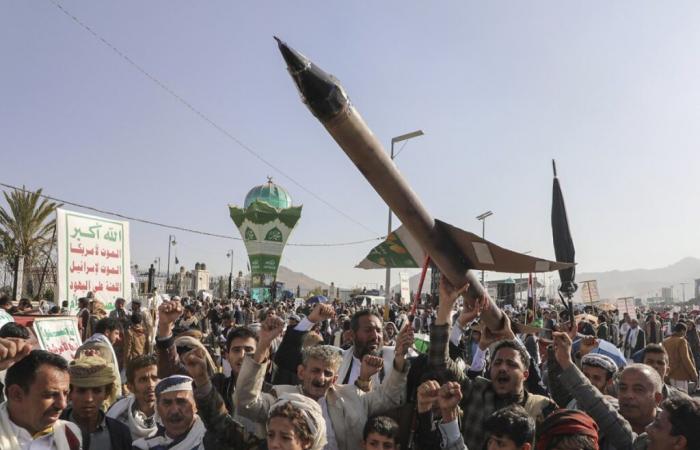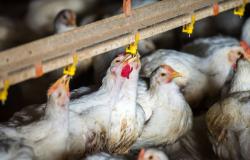Keystone-SDA
A new airstrike targeted the Yemeni capital Sanaa on Friday, Houthi rebels said. They had earlier claimed responsibility for missile and drone attacks against Israel.
This content was published on
December 27, 2024 – 9:35 p.m.
(Keystone-ATS) This strike comes the day after deadly Israeli raids on sites in the hands of these rebels, including Sanaa airport, where the head of the World Health Organization (WHO) was.
It was not immediately clear who carried out Friday’s strike on the Yemeni capital, also reported by witnesses. The Houthis speak of “American and British aggression”.
Earlier, the rebels said they had fired a missile towards Tel Aviv airport (central Israel), launched drones towards the city of Tel Aviv and attacked a ship in the Arabian Sea.
In Israel, the army claimed that a missile launched from Yemen had been intercepted before crossing Israeli territory. Warning sirens were sounded in central Israel due to the possibility of falling debris.
Deadly strikes Thursday
The Houthi attacks come after Israeli strikes Thursday on rebel-controlled sites, including Sanaa airport, bases, power plants and port facilities elsewhere in Yemen, what the insurgents called “a crime.”
Six people have died in Yemen according to the Houthis. Four of them at Sanaa airport and around twenty travelers and staff members were injured there, according to the deputy minister of Transport in the rebel administration, Yahya al-Sayani.
WHO Director-General Tedros Adhanom Ghebreyesus was at Sanaa airport at the time of the bombing and reported on X that he was “safe and sound.” He reported on Friday on
Airport damaged
Mr. Sayani told him that flights had resumed on Friday at 10:00 a.m. local time (8:00 a.m. Swiss time) at Sanaa airport. At the time of the attack, many passengers were preparing to board a flight while another plane was scheduled to land, he added.
The control tower was “directly affected” as well as the departures room and navigation equipment, he said. AFP images show the top of the control tower destroyed, the windows of a building broken and pieces of glass littering the ground.
Since 2022, only the national airline Yemenia has provided a limited commercial connection from Sanaa airport, with Amman as the main destination. Between 2016 and 2022, it only hosted humanitarian flights operated by the UN.
The Israeli army claimed to have targeted Thursday “military infrastructure used by the Houthis at Sanaa airport” as well as power plants and military sites notably in Hodeida (west), again in response to attacks by the rebels.
UN Secretary-General Antonio Guterres on Thursday condemned an “escalation”, stressing that strikes on transport infrastructure “pose serious risks to humanitarian operations at a time when millions of people need life-saving assistance”.
The Houthis, supported by Iran, control Sanaa as well as large swaths of Yemen, a poor country in the grip of a civil war for a decade. “Israeli aggression will only increase the determination of the Yemeni people to continue to support the Palestinian people,” the insurgents said in a statement.
“Destroy infrastructure”
Tens of thousands of demonstrators gathered in central Sanaa on Friday to protest Israeli strikes the day before and reaffirm their support for the Palestinians.
“The equation has changed and has now become: airport versus airport, port versus port, and infrastructure versus infrastructure,” protester Mohammed al-Gobisi told AFP. “We will not tire of supporting our Palestinian brothers.”
Since the start of the war in Gaza, the Houthis have launched numerous attacks against Israel, in “solidarity” with the Palestinians.
Israeli Prime Minister Benjamin Netanyahu again warned on Thursday that his country would continue to strike these rebels. “We are determined to cut off this terrorist branch from the Iranian axis of evil,” he said after asking the army to “destroy the infrastructure” of the Houthis. “We will hunt down all the Houthi leaders (…),” threatened its Defense Minister Israel Katz.
Most Houthi attacks against Israel were countered or caused only material damage. But last Saturday, a missile injured 16 people in Tel Aviv and in July, an Israeli civilian was killed in Tel Aviv by a drone explosion.
Israel responded with airstrikes in Yemen, where the Houthis took control of Sanaa in 2014 after a blistering offensive, sparking war in the poor country on the Arabian Peninsula.
The rebels also attack ships linked according to them to Israel, the United States or the United Kingdom, in the Red Sea and in the Gulf of Aden, despite strikes also carried out by the American army.






